… with NEWS of the pandemic on August, 11, 2021
…and with Jörg’s personal recommendation in books…
Started in February 2020, the SAJO blog is providing a thread through the pandemic with up-to-date information and suggestions around SARS-CoV-2.
You may zoom in and out using CTRL+ and CTRL-
Today, we are counting 204 M COVID-19 cases globally, in Germany alone there were 3.8 M cases. Numbers keep climbing, while the vaccination rate is slowing down considerably. Last week, the US top immunologist Tony Fauci voiced the alarm that a combination of a too low vaccination and a surging infection rate is a recipe for disaster. This will pave the way for more variants of the virus with the constant risk of one emerging mutant capable of a vaccine escape. Now Germany is even destroying unused vaccine doses. This is a shame when other countries are in desperate need of vaccines. My appeal to you: Should you not yet have had your shots, please get them now. Every dose wasted is one too many.
Now, let’s read. Summer is not over yet! Just as in 2020, I am offering a very personal list of books I consider well worth reading. For last year’s suggestions, please visit https://www.sajo-innovation.de/blog/summer-reading-2020
This summer’s pick would be
Frank M. Snowden (2020): EPIDEMICS AND SOCIETY
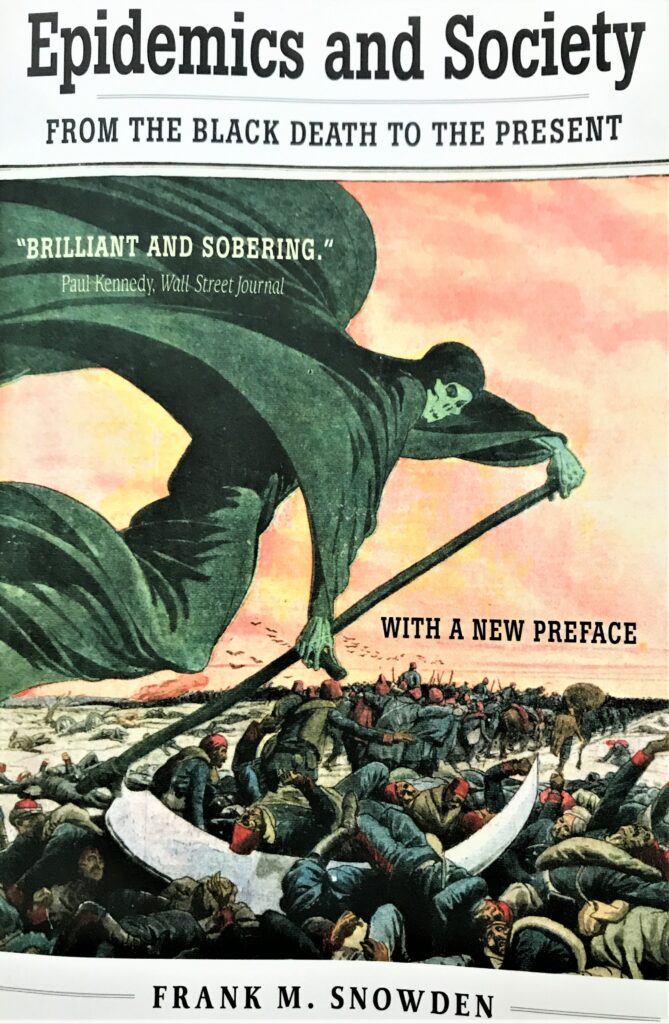
You didn’t think this was a surprise pick, did you? It was finished in 2019, what a timing. Snowden is a Yale University professor emeritus. He is leading us through the major epidemics that had pestered (sorry, I could not resist the pun) mankind over the last 2500 years. What is more, he shows how human society is fueling the emergence and the spread of infectious diseases. In many detailed stories he is examining how societies did and still do react upon an epidemic, and how epidemics had shaped human history. It is a telling story that is repeating itself. What strikes the reader is one of the last chapters dealing with the SARS outbreak of 2002/03. The world made exactly, and I mean exactly, the same mistakes then, as they did in 2020, from the obfuscation by Chinese authorities to a lackluster reaction by the WHO. The only reason SARS did not take over, is its low transmission rate, being dependent on droplet infection rather than airborne transmission. Lucky we were then. There were no lessons learnt, though. An important if sobering read.
Of course, there are lots of books that need to be read. So, here we go with five more enjoyable reads that I highly recommend for this summer:
Stephen Jay Gould (1989): WONDERFUL LIFE
What a great book. Gould was a paleontologist and a wonderful and prolific writer. He loved what he wrote about, which becomes clear from the first page.
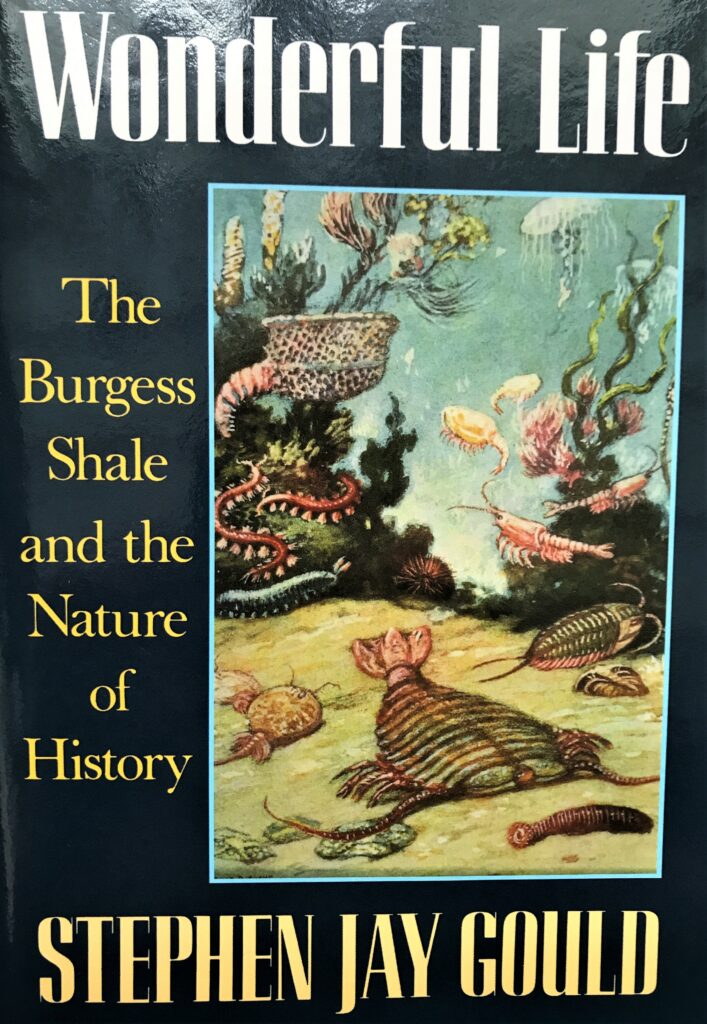
In this book, he is describing the discoveries made in the early years of the 20th century by C.D. Walcott at the Burgess Shale, a remnant of beings long gone (long gone meaning 500 million years), and the following reinterpretation by H.B. Whittington. The remarkable findings include a multitude of organisms with an amazing range of different anatomies, an early playground of evolution. The animals seem at times outlandish, but they were very earthly. They all disappeared in one of the extinction events Earth had experienced in the past. Now, my question would be, are we currently facing another one? We had asteroids, volcanoes, major climate changes, earth magnetic field flips, each of which had reduced the number of global species by more than 90 %. Is the human species the next annihilator? When it comes to the number of species extinctions within the very short time that humans are roaming the planet, the answer is yes. Well done, indeed.
Max Perutz (1998): I WISH I’D MADE YOU ANGRY EARLIER
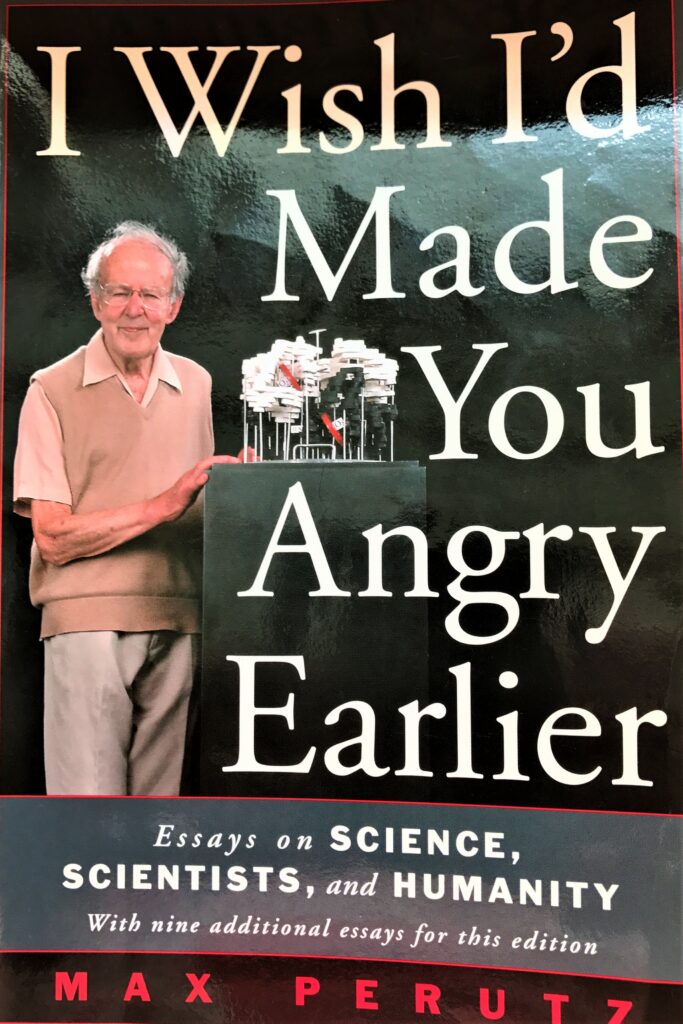
Max Perutz to me was one of the greatest scientists of the 20th century. He shared the 1962 Nobel Prize in Chemistry for his work on solving the crystal structure of hemoglobin, one of nature’s most fascinating molecules. It took him more than 20 years of hard and just brilliant work. This book is a collection of essays he had written. The spectrum of his interests is very broad. They are ranging from crystallography of course to malaria, or the development of nuclear weapons, which he strongly opposed, and some biographical sketches of other scientists. It is a wonderful collection of thoughtful essays.
Rachel Carson (1962): SILENT SPRING
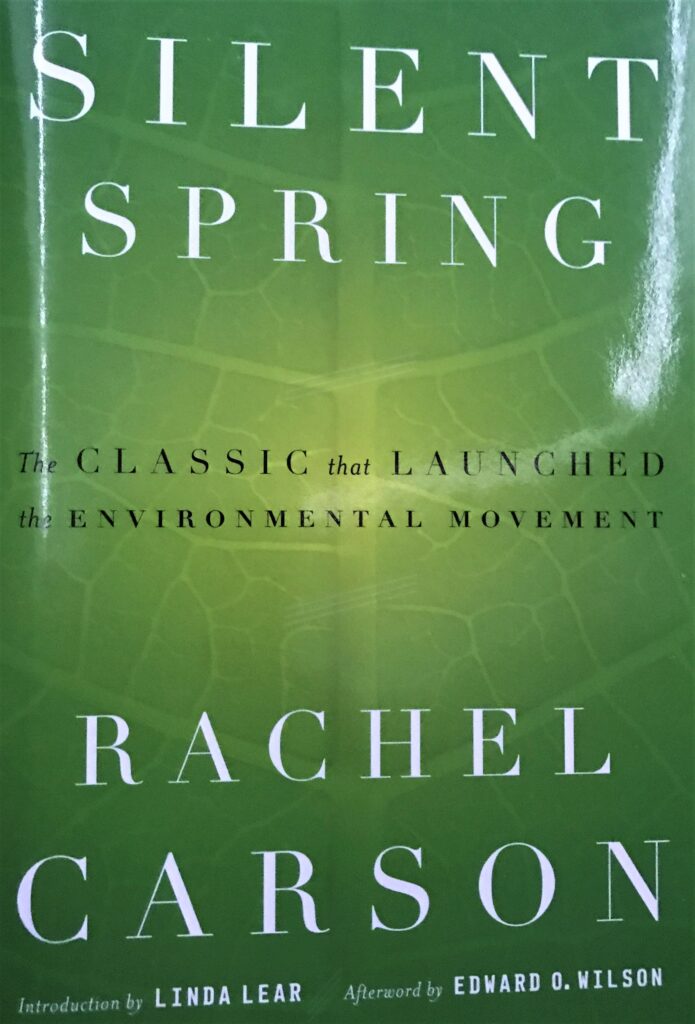
Rachel Carson was a biologist and a great writer. She let the readers know about the nature of chemical pesticides, so nobody may pretend not to have known about their effects on the environment. This book was written almost sixty years ago, and yet today it is a timely piece. Sometimes, this book sounds as if it were written today: In agriculture and forestry, people keep making the same mistakes, over and over again. Planting monocultures, then spraying the hell out of “pests”, killing all the pests’ predators along the way. Next time the pest is coming, there are no natural defenses, so you spray all over again. Great read, but rather depressing when watching what is being done to fields and forests globally today.
Bill Gates (2021): HOW TO AVOID A CLIMATE DISASTER
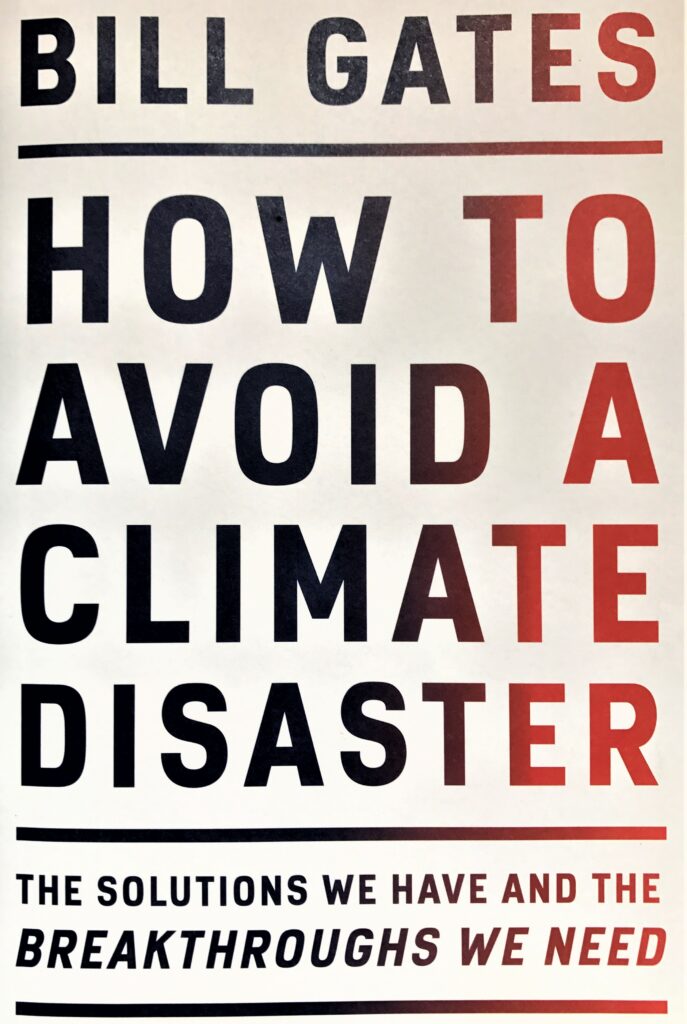
This book is a surprise. In a tour de force, Gates is leading us through his own lessons he had learned while talking to numerous experts over the course of a decade. At a mere 230 pages, it is a good weekend read. But it will keep you mulling about its content for a lot longer. To make the complex problem with manmade climate change understandable, Gates is breaking it down into several easy to comprehend basics. And some basic numbers. What I liked best with this book is the notion Gates makes that it will not suffice to just reduce greenhouse gas emissions. IT IS NOT ENOUGH! A reduction will just lead to a less speedy climate change. The outcome will be the same. This is a fact politicians and economists are duly ignoring. Gates also makes suggestions regarding technological solutions, and ways to cope with increasing temperatures, but these will need to be applied with care. There is one major contributor to climate change, he does only mention between the lines, though: The number of human beings is increasing at an exponential rate. Nevertheless, this is a book worth reading if you want to get a glimpse at the challenges we and our children will be facing.
Carl Zimmer (2000): PARASITE REX
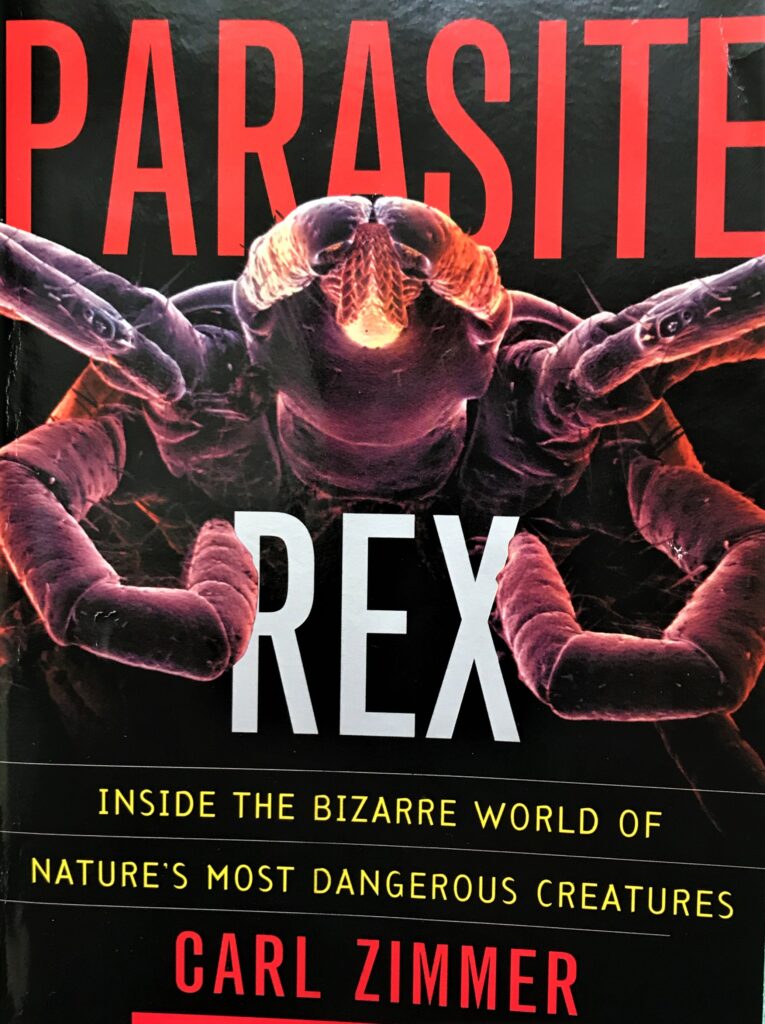
This is a fun book to read. Zimmer is guiding us through the fascinating world of parasites. From protozoans to fungi, crustaceans, and birds (to name just a few), it is full of vividly described examples of how organisms are settling in with others. It is thrilling to delve into the strategies parasites are deploying, to overcome their hosts’ defenses, or simply to fool them. There is one drawback of the book’s contents, though: It is no good stuff for dinner conversation. This, I had to learn the hard way.
Hope you enjoy,
Jörg
A post-scriptum: Last week, one of the great ones decided to leave the stage for good. It was only last year that his band had revisited one of their historic songs:
https://www.youtube.com/watch?v=Gg9cNGHl-bg
To all those of you too young to know, he is the good-natured one of the bearded guys, on the left.
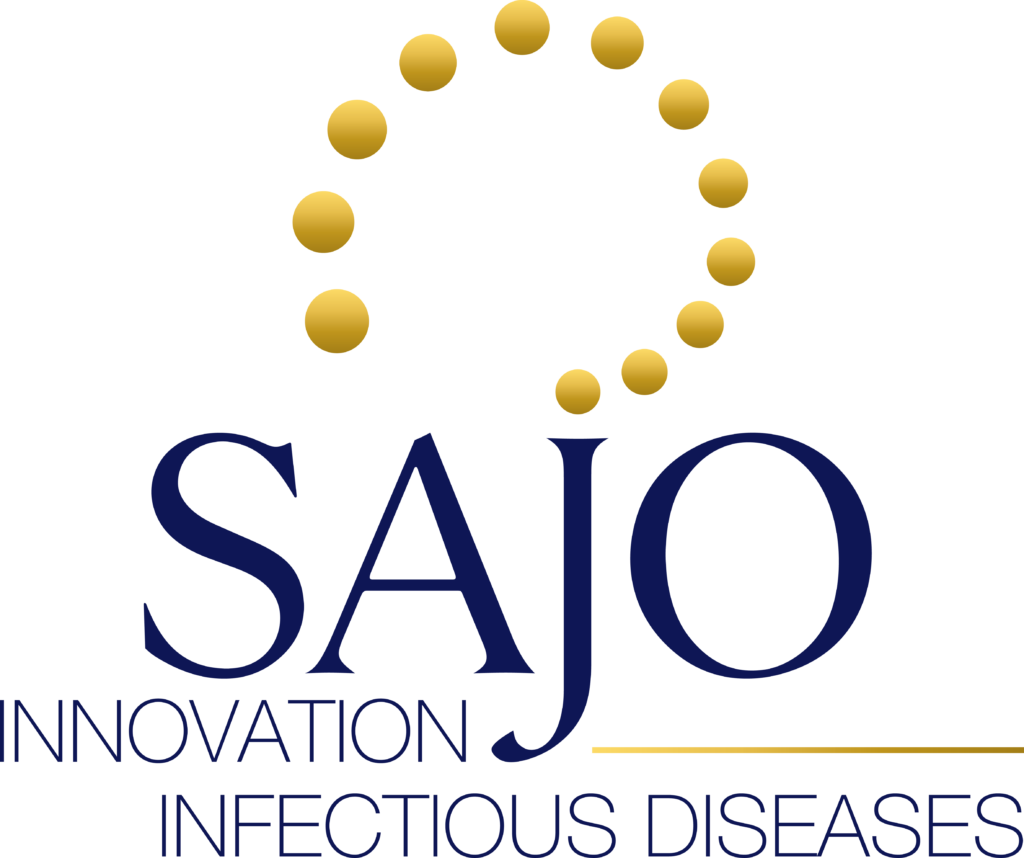

This is giving me the opportunity to thank all the giants on whose shoulders we are standing today. Their genius, their enthusiasm, and their tireless work built the foundation on today’s progresses. Thank you!
SAJO – for a healthy and better future!
SAJO is consulting all around infectious diseases. We are applying our know-how, that we have acquired in more than 20 years. We do what we can to fight this pandemic.

This is post No. 190. To our delight our blog is receiving a lot of acceptance, we love to share our know-how and experience. Please feel free to share the link – it is an informative tool to fight this pandemic.
(Note: We are no members of political parties, religious congregations, or societies. We value independence, sovereignty, and freedom. With our blog we are providing purely scientific advice, without conflict of interest, altruistic. We are not being paid for it.)

#1 Should you like to have SAJO antivirals or antibacterials, or to give a contract, or need consultation, or to invest into SAJO, please do not hesitate to contact us. You may use the formular at our homepage or phone number or email.
#2 On a regular basis we are asked for ideas. For ideas please feel free to contact us as well. You may use the formular at our homepage or phone number or email.
The SAJO business model: https://www.sajo-innovation.de/sajo-Flyer.pdf
Visit Sabine at XING https://www.xing.com/profile/Sabine_Breun and Jörg at LinkedIn http://linkedin.com/in/jörg-baumann-phd-0710b11a3
